Ghee is clarified butter, whereas oil is a sticky, neutral and non-polar substance and butter is a dairy product that contains 80% butterfat. The variation among the food items are based on their ingredients, it’s uses & preparation methods. In South Asia and Middle Eastern countries, food is considered incomplete without ‘ghee’. Ghee, Butter and Cooking Oil are used to increase the taste of a dish. So, why is it that people are crazy about the liquid gold ‘GHEE’ and are forgetting about golden oil? Let’s find out.
Ghee is called ‘ideal cooking oil’ due to many treatment properties. It helps in digestion due to its light taste. It also helps in improving absorption the vital food nutrients and increasing the life energy force. It improves our strength and memory of the brain, the nerve system, and the immune system. Ghee lubricates joints and connective tissues, which makes the body flexible. It also helps stimulate the healthy flow of fluid in the whole body. Now the question is – Where can I buy ghee? Buy ghee online at our online store. Visit our website https://sureshdesighee.com/ to know more. Ghee is considered healthy in India since ancient times. It is also known for some medicinal properties. It is really interesting to know how ghee is different from other cooking oils! Ghee is an ideal fat for deep frying because its smoking point (where its molecules start to break down) is 250° C (482° F), which is above cooking temperatures of around 200° C (392° F) and above most of the cooking oils.
Butter is a dairy product that contains 80% butter (in commercial products) which is cold and in some areas, at room temperature and when it is hot, it is liquid. It is made by churning fresh or milk to separate the butterfat from the buttermilk. It is usually used in plain or toasted bread products and cooked vegetables as well as a spice, as well as a spice like cooking, sauces and pan-frying. Butter contains butterfat, milk protein and water, and often salt is added. Butter can also be sold with extra flavor, such as garlic
Cooking Oil realize bulky for the stomach and the use of bad oil can guidance to indigestion, punctured artery and other problems. But, oil is also used for it. In oil, all trans fats are needed to function properly by our body and brain. There are many types of cooking oil available in the market; Groundnut oil, sunflower oil, sephola oil, rice bran oil, olive oil, some names. Some people use other types of fats, like desi ghee, for cooking.
Key Difference Between Desi Ghee, Butter & Cooking Oil
| GHEE | BUTTER | COOKING OIL | |
| Definition | It is prepared by boiling the butter, which is churned with cream (traditionally made by curd Manthan). Ghee is an ideal fat for deep frying because its smoking point is high. | Butter is a dairy product which contains 80% butter fat. It is solid when chilled and liquid when warmed. |
It is defined as neutral, nonpolar chemical substance. It is sticky liquid at ambient temperature. |
| Digestibility | Easy to digest with virtually no casein or lactose, which are common sensitive. |
Contains casein and lactose, which can cause digestive issues. | Bulky for the stomach and the use of bad oil can guidance to indigestion, punctured artery and other problems. |
| Made From | It is made from milk of animals. | It is made from churning milk or cream. | It is made from animal, plant or synthetic fat. |
| Smoke | 250 °C (482 °F) | 200 °C (400 °F) | 275–330 °C (527–626 °F) |
| Flavour | Rich And Nutty | Creamy, Smooth, Sweet | Flavourless |
| Total Fat Per Tablespoon | 5 g | 7.5 g | 5.5 g |


Buy Pure Desi Cow Ghee Online: Order Now. Free Shipping
Desi Ghee Vs Butter
Ghee has a high smoke point in comparison to butter, so it is not burnt quickly. This is perfect for sauteing or frying foods. Butter can smoke and burn at 350 degrees Fahrenheit (177 degrees Celsius), but ghee can withstand heat up to 485 degrees Fahrenheit (252 degrees Celsius). Ghee has a slightly higher amount of fat compared to butter and more calories. One spoon of ghee contains about 120 calories, while one teaspoon of butter contains approximately 102 calories. The difference in fat content varies by food manufacturer, but ghee is usually slightly more.
Desi Ghee Vs Cheese
Cheese is a dairy product derived from milk, which is produced in a wide range of flavors, textures, and forms by the milk protein casein. It is made by milk of cows, sheep, goats, buffalo, deer, camel and yak. Ghee is prepared by boiling the butter, which is churned with cream, and the liquid remains is removed. You can try desi cow ghee from https://sureshdesighee.com/ You can buy ghee online from our online store.

Buy Pure Desi Cow Ghee Online : Order Now. Free Shipping
Desi Ghee Vs Olive Oil
Desi Ghee boosts mental strength & physical strength and keeps the body healthy. It also helps in taking impurities from the body and enhances vision, keeps muscles and tendons healthy. Ghee helps to stimulate the digestive system and therefore helps in weight loss provided your diet is balanced and you are exercising. Olive oil is used to prevent heart attack, breast cancer, and migraine headache. Some people use high cholesterol, hypertension, associated with diabetes, blood vessel problems, and ear pain associated with infection and olive oil to treat gallbladder disease. Olive oil is also used to treat inflammation of the stomach due to the joints, intestinal gas. However, ghee has more features to be used in Ayurvedic treatment as is given the best result. Visit https://sureshdesighee.com/blog/ to know more.
Desi Cow Ghee is healthier than Olive oil. Since Ghee is clearly butter, it is lactose and casein free, which can be easily eaten by lactose intolerant people. Ghee is a stable fat for cooking, ghee is saturated fat, there is bioavailable vitamin A in ghee. Ghee contains conjugated linoleic acid (CLA), Ghee provides vitamin.
Desi Ghee Vs Dalda
The difference between Ghee and Dalda (Vanaspati) is that Dalda is hydrogenated refined oil and contains a high content of trans fat which is unhealthy for our health. Whereas Ghee is a clarified butter rich in vitamins. It also contains CAL and medium chain fatty acids and included DHA for brain development. Desi ghee is saturated fat which is considered to be good fat. We take orders online and deliver pure desi cow ghee. Try and taste our premium quality products and stay fit and healthy and keep your family happier always.
Desi Ghee Vs Coconut Oil
Ghee and Coconut oil are sources of fat and that may not traditionally be thought of as healthy but they both can offer some benefits to our health. Coconut oil and ghee, both are calorie-dense. The fats in coconut oil are primarily saturated fats referred to as medium chain triglycerides. These may help in balancing good cholesterol. But not digested in the same way as other fats. Ghee in moderate quantity is easy to digest and is always good for other health benefits.
Clarified Butter vs Desi Ghee
Clear butter is usually prepared by melting butter and allows all the components to distinguish from density. The water evaporates, floats on some solid surface and is cooked, and the remaining milk solid falls down and the butter fats (which will then be on top) are inserted when left behind. This butterfat is clarified butter. Ghee is prepared by boiling unsalted butter in a cooking vessel until all the water is evaporated and the milk has settled down to the solid or protein.
Nutrition Ghee Vs Butter
Ghee has a slightly higher amount of fat compared to butter and more calories. One spoon of ghee contains about 120 calories, while one teaspoon of butter contains approximately 102 calories. The difference in fat content varies by food manufacturer, but ghee is usually slightly more. Here’s a breakdown:
| Types of fat tbsp. | Ghee | Butter |
| Saturated | 10g | 7g |
| Monounsaturated | 3.5g | 3g |
| Polyunsaturated | 0.5g | 0.4g |
Health Benefits Of Ghee
- Ghee reduce your risk of heart disease.
Ghee is rich in conjugated linoleic acid, or CLA, a fatty acid that is considered protective against carcinogen, artery plaque and diabetes. Desi cow ghee can potentially be used to help prevent cardiovascular diseases.
- Good for the eyes.
Because ghee is rich in vitamin A, it is good for eyes. Vitamin A helps in adjusting the eyes to light shifts. In fact, moisture in the eyes depends on the presence of vitamin A in your body.
- Nature provided moisturizer.
Ghee acts as a natural moisturizer. And we mean not only with superficial application. Our skin contains fat or phospholipids in the membrane. the essential fat found in ghee, you can ensure good skin health not only from the outside but also from the inside.
- Rich in fat-soluble vitamins.
Ghee is rich in fat-soluble vitamins like Vitamin A, D, K and Vitamin E. The benefits of fat-soluble vitamins are:
- Vitamin A cellular development also helps in improving bone health along with healthy teeth.
- Vitamin D improves calcium absorption and can help prevent inflammation of the body.
- Vitamin E lesion enhances medical procedures and also helps in the immune system.
- Vitamin K helps regulate blood-clotting activities.
- Improve Digestive Function
When we digest fiber, the awesome small bugs in our gut actually make the active ingredient in ghee – butyric acid – on their own. They use it to keep the intestine healthy, detoxified, and properly sealed, and they also gobble it up as a source of energy. Because of this, once we ingest desi ghee it’s in a familiar environment and our body knows exactly what to do with it. Many people with leaky gut or other digestive issues have a severe lack of butyric acid – so supplementing with ghee is a great way to increase levels and improve digestion. Desi ghee also stimulates the release of gastric acid, supports healthy insulin levels, and encourages the generation of new (and the flushing out of oil) bile.
- Maintain Healthy Weight + Boost Detoxification
Once ingested, the medium-chain fatty acids found in ghee aid burn the toxic/bad fats in our body by attracting stubborn fat-soluble toxins from our cells and helping to flush them out. This increased fat metabolism is good for those trying to shed pounds, or maintain a healthy weight. Also, it is important to note that consuming fat does not make you fat- it’s absolutely essential for a healthy body.
Which type of fat is considered healthy ?
Considering a healthy diet, the presence of Monounsaturated fats and polyunsaturated fats help balance healthy cholesterol levels and provide protection against heart problems. Saturated fats should also be included in a nutritious diet, such fats are solid fats because they tend to become solid at room temperature. The human body breaks down fat and utilizes it for energy and further processes. Unsaturated fats tend to lower triglycerides and cholesterol levels, which makes them healthier as compared to saturated fats. High levels of saturated fat in the blood increases cholesterol levels which leads to plaque formation in blood vessels. This would make the blood and oxygen become harder to travel through the body which could also raise the risk for stroke and heart disease.
Do ghee benefit Digestion and Colon health ?
All the dairy products available contain a compound known as butyrate, a type of short-chain fatty acid which is the main source of energy for the cells that nourish your colon and support them to regenerate. Such functionality is pivotal to maintain colon health and digestion.
Ghee also has the presence of butyrate, which acts as addition to a good amount of short-chain fatty acids. Also consuming foods rich in fiber can help your body improve the production of short-chain fatty acids, a better way to enhance colon health.
Does ghee produce less Acrylamide than other cooking oil ?
During heating, ghee tends to produce much less acrylamide, a chemical compound that is released after heating up starchy foods which is considered as a toxin and may be linked to cancer. According to research, it has been found that other cooking oil produced more acrylamide as compared to ghee when each was heated to 320°F (160°C).
Hence, heating ghee rather produces much less of the toxic compound acrylamide as compared to heating other vegetable oil.

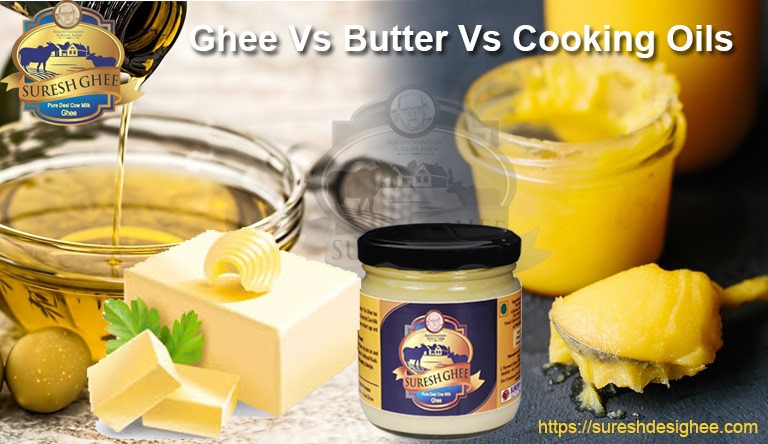
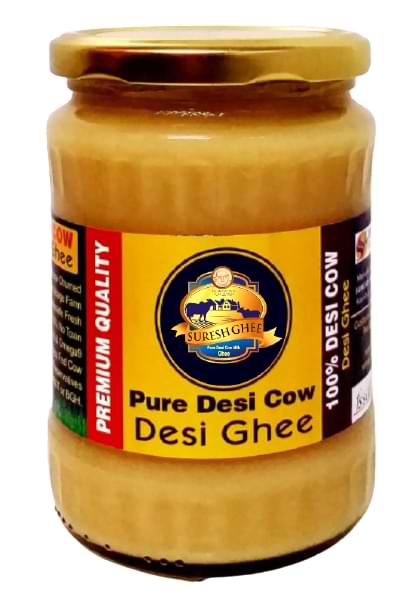
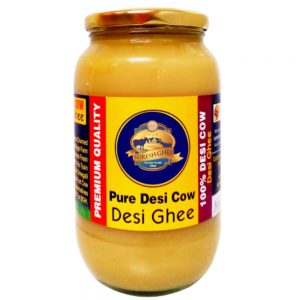
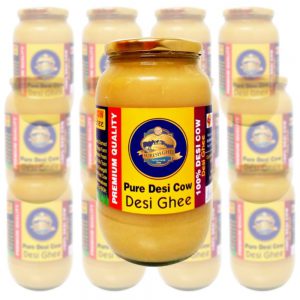
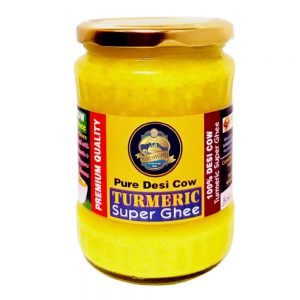
 WhatsApp us
WhatsApp us 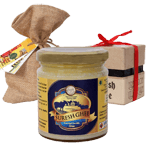
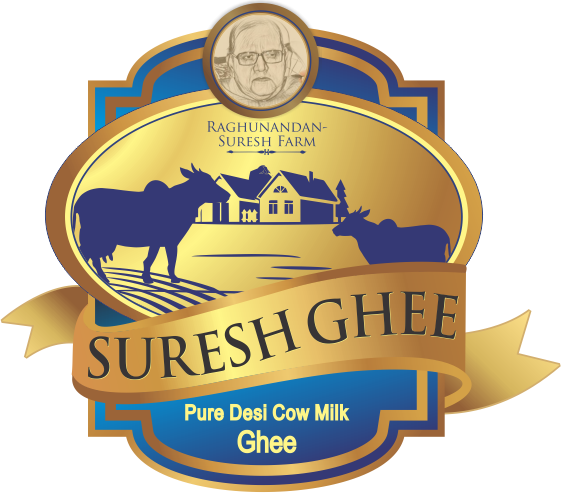
Naveen m...